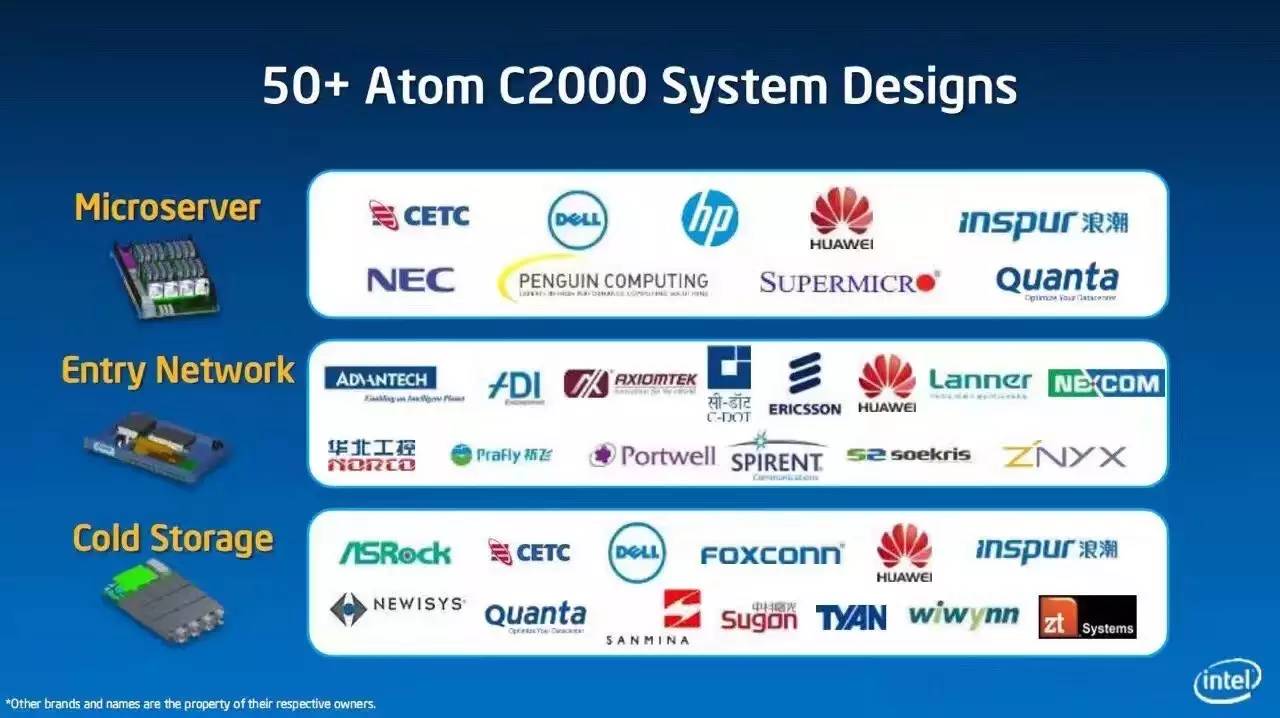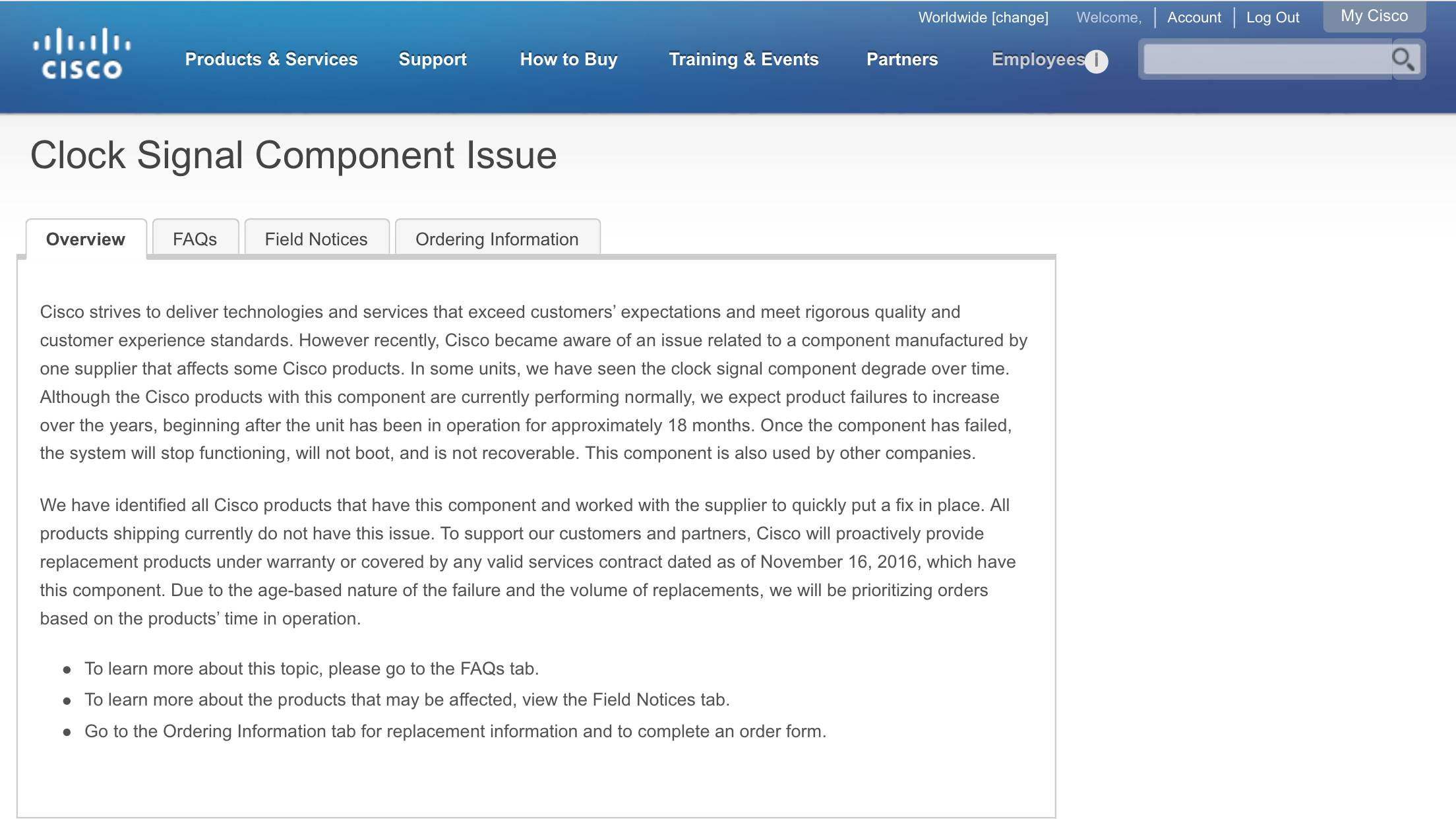思科「时钟芯片部件问题」确认是intel的ATOM C2000引起。该部件供应商为Intel,意味着使用该部件的所有设备厂家均存在同样问题。

使用该芯片的部分厂商列表:

Atom C2000系列已经被用于50多套微型服务器、冷存储、网络系统设计,包括Advantech、华擎、思科、戴尔、Ericsson、惠普、华为、浪潮、NEC、Newisys、华北工控、Penguin Computing、Portwell、新飞、广达、Supermicro、泰安、WiWynn、ZNYX Networks等等。
Atom C2000系列采用SoC单芯片设计,CPU架构是新的Silvermont,最多八核心八线程、4MB二级缓存,制造工艺也是新的22nm SoC(和消费级Haswell用的不太一样)。
支持双通道ECC DDR3/L-1600内存,最大容量64GB,最多四个PCI-E 2.0控制器、16条信道,扩展接口最多四个2.5 GbE、两个SATA 6Gbps、四个SATA 3Gbps、四个USB 2.0(没有原生USB 3.0),并支持VT-x、AES-NI、Quick Assist等技术。
Intel在其2016年第四季度财报电话中透露,其某款CPU故障影响了公司盈利,该公司第四季度的收入创下了新的记录,同时2016年总收入也创下了594亿美元的记录,但CPU的故障对其数据中心业务收入产生重大影响。
英特尔CFO兼执行副总裁Robert Holmes Swan总结了数据中心业务的失败原因,其数据中心工作组(DCG)利润同比下降14%,只剩下19亿美元。Swan列举了14nm转换和一次性长期交叉许可协议导致下降的问题,同时提到了CPU故障对财务造成的影响:
他说:“我们在第四季度看到产品质量存在问题,在某些使用和时间条件下,预期的故障率略高,我们已经着手在解决这个问题。我们认为可以通过与合作伙伴一起来解决这个问题。”
英特尔的数据中心工作组(DCG)生产大量产品,涵盖各种领域,如CPU、网络和存储,因此我们主动跟进英特尔以更清楚地了解故障的性质。英特尔方面回应表示,这些故障仅限于英特尔Atom C2000系列产品,主要被应用于存储和网络基础设施。
英特尔已经展开了一系列的补救措施,将其数据中心CPU占用(占全区服务器99%以上)扩展到其他利润丰厚的部分,例如网络和存储领域,其市场渗透率相对较低。由于英特尔在这些领域的努力,它减少了DCG对传统企业CPU市场的依赖,这部分收入目前只占其收入的50%。不幸的是,CPU故障与英特尔选定的三个领域中的两个领域相关。
英特尔表示,目前已经有能够解决这个问题的方法,正如财报电话中指出的,问题是要找到合适的备用方案来解决问题。英特尔可能会淡化这个问题,任何新的芯片版本都需要大量的支出和工程设计工作,而这目前已经被DCG的底线所拖累。
英特尔不认为这些故障对其财务表现会产生长期的影响,而且目前能够确定的出现故障的也只是Atom C2000系列。(参考来源:SDNLAB.COM)
英文原文:
CPU Failures Hurt Intel's Bottom Line(时间:2017年1月31日)Intel revealed during its Q4 2016 earnings call that unspecified CPU failures have affected its bottom line. The company enjoyed record Q4 revenue and a record $59.4 billion in overall 2016 revenue, but CPU failures reduced the Data Center Group's financial performance.
Intel's Robert Holmes Swan, the new CFO and executive vice president, vaguely defined the failures as he explained why the Data Center Group's (DCG) profit declined 14% year-over-year to $1.9 billion. Swan listed the 14nm transition and a one-time long-term cross-licensing agreement as issues that contributed to the decline, but also mentioned undefined CPU failures as a drag on financials (via Seeking Alpha):
"But secondly, and a little bit more significant, we were observing a product quality issue in the fourth quarter with slightly higher expected failure rates under certain use and time constraints, and we established a reserve to deal with that. We think we have it relatively well-bounded with a minor design fix that we're working with our clients to resolve. So, those two one-timers in the fourth quarter weighed on DCG [Data Center Group] margins, and we do not expect that to continue in 2017."
Intel's Data Center Group produces numerous products that fall into a wide range of segments, such as CPUs, networking, and storage, so we followed up with Intel for more clarity on the nature of the failures. Intel replied that the failures are limited to the Intel Atom Processor C2000 product family, which is used primarily for storage and networking infrastructure.
Intel has launched a concerted campaign to extend its data center CPU stranglehold(it occupies over 99% of the world's servers) to other lucrative "adjacencies," such as the networking and storage segments where it has relatively low market penetration. Due to Intel's efforts in these areas, it has reduced the DCG's reliance on the traditional enterprise CPU market, which now only accounts for 50% of its earnings. Unfortunately, the CPU failures are confined to two of the areas that Intel defines as key growth drivers.
Intel indicated that it has an immediate workaround that addresses the issue, as well as a "minor" silicon fix that solves the problem entirely. As noted in the earnings call, the problem is of enough import that Intel had to establish a reserve to address the issue, so frankly, Intel may be downplaying the problem. Any new silicon revision requires significant expenditures and engineering effort, as proven by the drag on DCG's bottom line.
Intel doesn't consider the failures to have a long-term impact on its financial performance, and, for now, the still-undefined issue appears to be limited to the C2000 Atom family. We're following up for more specific information on the failures, and will update as needed.
原文链接:http://www.tomshardware.com/news/intel-cpu-failure-atom-processor,33538.html
思科公司近日发布了预警:2016年11月16日之前交付的部分版本的路由、光网络、安全和交换机等产品中所使用的一款电子部件不可靠,可能会在一年半后失效,导致受影响的硬件永远无法正常工作。
思科在安全公告中表示:“虽然使用这款部件的思科产品目前运行正常,但是我们预计产品故障在今后几年会增加,该部件在投入运行约18个月后会开始出现问题。”
“一旦该部件失效,系统就会停止正常运行,启动不了,也恢复不了。”
思科表示,这款时钟信号部件还被其他公司所使用,但它没有具体点名是哪几家公司。预计其他厂商很快就会发布这种类型的进一步通告。
思科表示,它是在去年11月底获悉这个问题的,已与那家部件供应商合作,修复有故障的部件。因而,目前交付的产品并不受到影响。
针对受影响产品保修期或服务合同到2016年11月16日的客户,思科打算提供更换产品。它将优先为使用受影响产品时间最长的那些客户提供更换部件,那是由于部件运行时间与部件故障之间存在着关联。
思科坚称这不是召回行为,而是一次积极主动的更换。该公司还表示,虽然那家部件生产商表示18个月后故障会更有可能频发,但是它预计产品在运行三年后会出现故障激增的情况。
思科在公告中拒绝透露生产该故障部件的那家供应商的名称,也拒绝透露其他受影响的厂商的名称。IT网站The Register 要求思科透露进一步的信息,但这家公司拒绝置评。
公司发言人在电子邮件中告诉The Register:“思科在竭力提供超乎客户预期,在质量和客户体验方面满足苛严标准的技术和服务。我们已意识到与一家供应商生产的时钟信号部件有关的问题。我们已与那家供应商合作,努力解决这个问题;我们在为客户提供相关信息和支持。”
思科的公告涉及下列产品:
网络 |
FN-64230 |
NCS1K-CNTLR |
路由 |
FN-64231 FN-64252 FN-64253 |
NCS 5500线路卡 IR809/IR829工业集成服务路由器 ISR4331、ISR4321、ISR4351和UCS-E120 |
安全 |
FN-64228 FN-64250 Meraki Notification |
ASA 5506、ASA 5506W、ASA 5506H、ASA 5508和ASA 5516 思科ISA 3000工业安全设备 MX84 |
交换机 |
FN-64251 Meraki Notification |
Nexus 9000系列N9K-C9504-FM-E/N9K-C9508-FM-E/N9K-X9732C-EX MS350系列 |
网络工程师汤尼·马特克(Tony Mattke)在一篇博文中表示,这几个月来,坊间一直在盛传ISR 4331路由器问题以及思科可能召回。
他写道:“眼下我们许多人接到了客户经理打来的电话,不过我们当中一些人(包括本人)可谓两眼抹黑,完全不知情。考虑到在外头使用的产品数量众多,这令人不安。”
本次故障时钟部件非思科自研芯片,该部件供应商为业内设备厂商供货,意味着使用该部件的所有设备厂家均存在同样问题。思科正面的、积极的、主动的揭露并快速处理此事,请大家客观的一起关注。
该故障并不是立即的故障,而是技术人员通过长期的测试发现部分型号产品的时钟部件可能会在将来有潜在的问题(18个月后),思科11月发现问题开始3个月内的时间内就提出了解决方案,保证设备在一年保修期内解决此问题。
时钟信号部件问题思科官网公告:

云头条编译|未经授权谢绝转载
相关阅读:
中高端IT圈人群,欢迎加入!